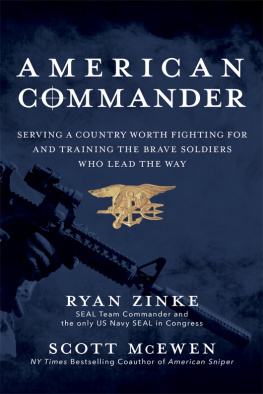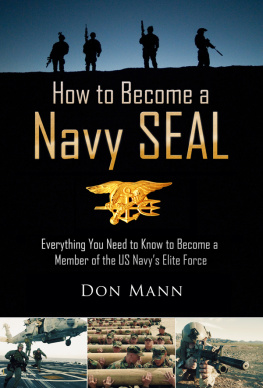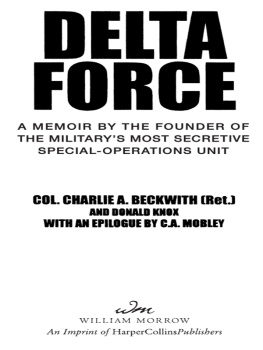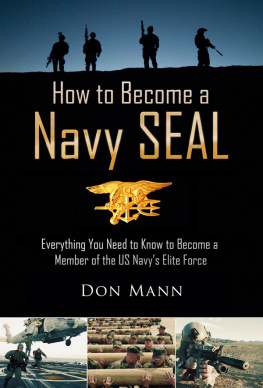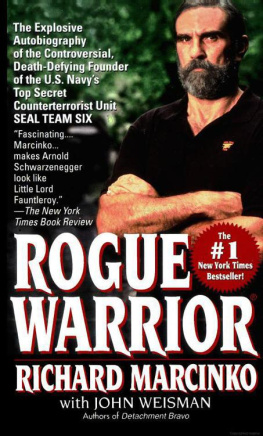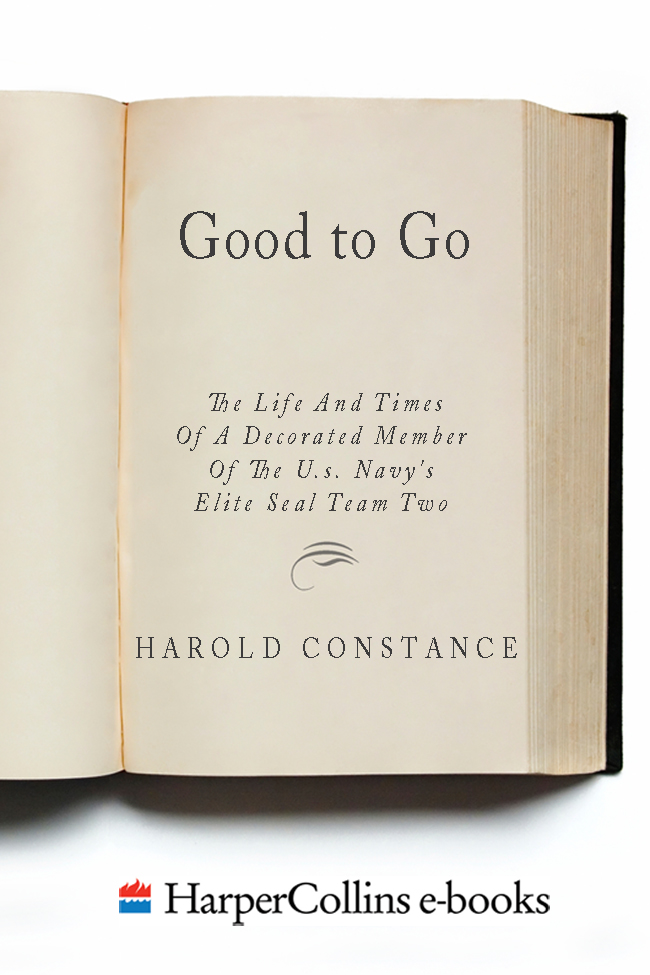Killing is always a gruesome and ugly thing. But, in a war like Vietnam, body count was the measure of success. I could watch a sad movie and feel strong pulls at my heartstrings and then, a few hours later, become a calculating, viciously proficient killer. Its like we have become light switches... on... off... at the flip of a finger. Wed been in-country for a little more than 180 days. It changed us, and we were the better for it.
AVON BOOKS
An Imprint of HarperCollinsPublishers
10 East 53rd Street
New York, New York 100225299
Library of Congress Catalog Card Number: 97-303
ISBN 0-380-72966-0
EPub Edition March 2014 ISBN 9780062358103
GOOD TO GO. Copyright 1997 by Harry Constance and Randall Fuerst. All rights reserved under International and Pan-American Copyright Conventions. By payment of the required fees, you have been granted the nonexclusive, nontransferable right to access and read the text of this e-book on-screen. No part of this text may be reproduced, transmitted, downloaded, decompiled, reverse-engineered, or stored in or introduced into any information storage and retrieval system, in any form or by any means, whether electronic or mechanical, now known or here in after invented, without the express written permission of HarperCollins e-books.
The William Morrow edition contains the following Library of Congress Cataloging in Publication Data:
Constance, Harry
Good to go: the life and times of a decorated member of the U. S. Navys elite SEAL Team Two I Harry Constance and Randall Fuerstlsted.
p. cm.
1. Constance, Harry. 2. United States. Navy. SEALSHistory.
3. United States. NavyBiography. 1. Fuerst, Randall
II. Title.
VG87.C65 | 1997 | 97-303 |
359.9dc21 | CIP |
[B]
Avon Trademark Reg. U.S. Pat Off. and in Other Countries, Marca
Registrada, Hecho en U.S.A.
HarperCollins is a trademark of HarperCollins Publishers Inc.
OPM 15 14 13 12 11 10 9 8
Harry Constance was my neighbor. Some months ago, I started realizing he was more than the average, up-beat, good guy neighbor you said hello to a couple of times a week. We had our share of mindless conversations about the weather, kids, politics, and camping. Harry was always helpful and quick to offer assistance, and on this particular day he had volunteered to assist me in landscaping my yard. Unfortunately, he had to call and cancel due to a problem at work.
At the time, Harry was the Director of Security at the Sacramento Army Depot. The depot had been moving employees and weaponry out of the facility because it was in the process of being closed, and Harry was needed to provide security for a caravan of munitions on their way to the Concord Naval Weapons Station. An informant had given information that a local Crips gang had gotten word of the shipment and had made plans to hijack the weaponry. I was taken aback. This was Hollywood scriptingnot local news.
When he returned, I quizzed Harry. Did you use an Uzi or sawed-off shotgun? How about a bulletproof vest and riot gear? Were the local police brought in? He shrugged his shoulders and smiled. No, he said. They changed the time of departure. I took my three-fifty-seven revolver and a twelve-gauge shotgun. No big deal. That was all.
No big deal! I watched the L.A. riots along with the rest of the world. Ive seen reports on the gang epidemicof drive-by shootings and other criminal activitiesand all he could say was No big deal. I remember thinking that this is someone who is either pretty stupid or overly macho. I commented something to this effect. Harry leaned his head back and recounted several stories about his time in Vietnam as a Navy SEAL. Stories of hand-to-hand, lethal combat. Stories about guns being placed to his head, and of other events that helped shape the character of a young man in war. The Vietnam War. A war that was not tidy and clean. Certainly not a war that was played by all the gallant rules of the Hollywood-sanitized, hero-filled World War II genre films of the 1950s and early 60s.
Harry killed people. Lots of people. He was trained and commanded to put himself in positions demanding he kill or be killed.
Harry came home after the war, served this country for several more years in less harrowing tours, was one of the first antiterrorist strike force members, went through hell, and today is the picture of the contented middle-aged family man. He likes to hunt and fish, is happily married, has his faithful dog he takes everywhere, and has not been plagued by post-traumatic stress disorder.
I think you will find the stories within the pages of this book to be fascinating. There is no embellishment. There is no need for it, as the true-to-life version is sufficient. This is not a Ramboesque persona that was larger than life. Instead, this is a story of an immature, oftentimes scared young man whose character was forged in a furnace most will never contemplate.
No big deal, he said. And he meant just that. The Crips did not come to visit, but the driver was arrested for leaving the truck unguarded in a remote back lot. Harry was sorry hed had to cancel me out.
I asked if the stress of this kind of event fatigued him much. You know, the good Lord has watched over me time and time again. How else do I explain why I lived and others died? Im happy to be alive, to ride my horses, to be with Barb and my family.
This book is dedicated to the thousands of servicemen and servicewomen who came home to a country that did not want to repatriate them. Who returned to face people who, in their zeal, somehow equated the conscripted warriors with the political leaders who had sent them off to war. Who metamorphosed back from a world of war to a changed, civilized society. A world they quietly refit themselves into without complaint.
I was paid to do a job and I did it. No big deal, says Harry. Look at me. I have a roof over my head and a family I love. Im good to go!
Randall Fuerst and I are grateful to many people who helped make this process go from fireside chat to printed page. First and foremost are Zach Schisgal, our editor at William Morrow, and assistant editor Anne Cole, for their patience and perseverance in working with us. We both wish to thank Nancy Jellison and Dave Marriner for their hours of dedication and keen insight in helping polish the rough edges.
I would like to thank my wife Barbara for her support. Also, many thanks to my daughter Carrie and her husband Paul for listening to all my war stories. To my son Darren, a computer wizard; my brother Charles; brother-in-law Frank Thornton; and my close friend Gary Chamberlin, for always being there.
Dr. Fuerst wishes to thank his family: his wife, Shirlene, along with Rachel, Ryan, and Marissa for supporting him through the many, many hours of research, writing, and editing. Marilyn Fuerst, his mother, gave tremendous support, which was greatly appreciated. He also wants to sincerely thank his partners, Drs. Fred Fuerst, Palmer Lee, and Scott Gittins. Dr. Kenji Hamadas encouragement deserves recognition, as well.
CONTENTS
So this isVietnam. My first glimpses came through a broken cloud cover while making our final approach into Tan Son Nhut Air Base near Saigon. The anticipation continued to gnaw at my gut. Wed prepared for this for almost two years, and here we were. I was the point man for SEAL Team Two, Seventh Platoon, and we were minutes away from our first exposure to warm temperatures, high humidity, foreign culture, foreign language, foreign foodsand a foreign war.


